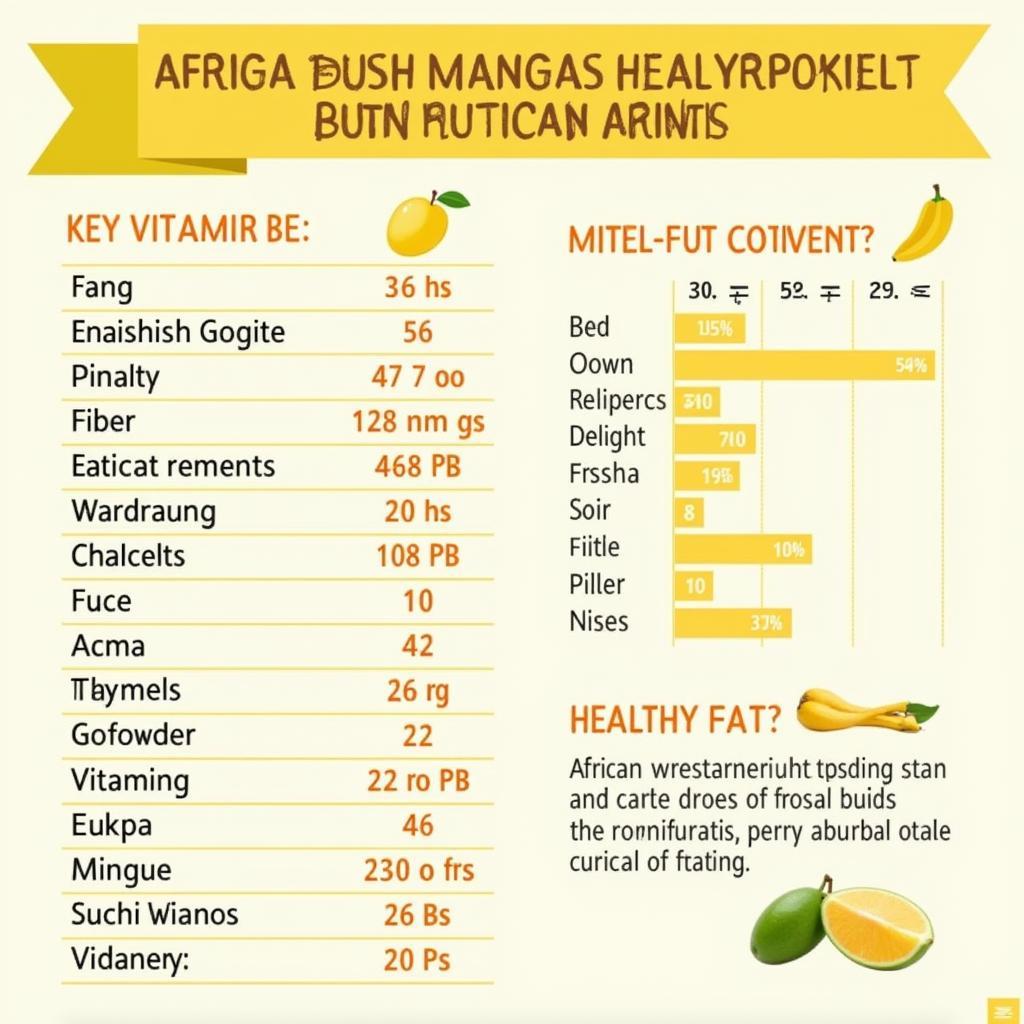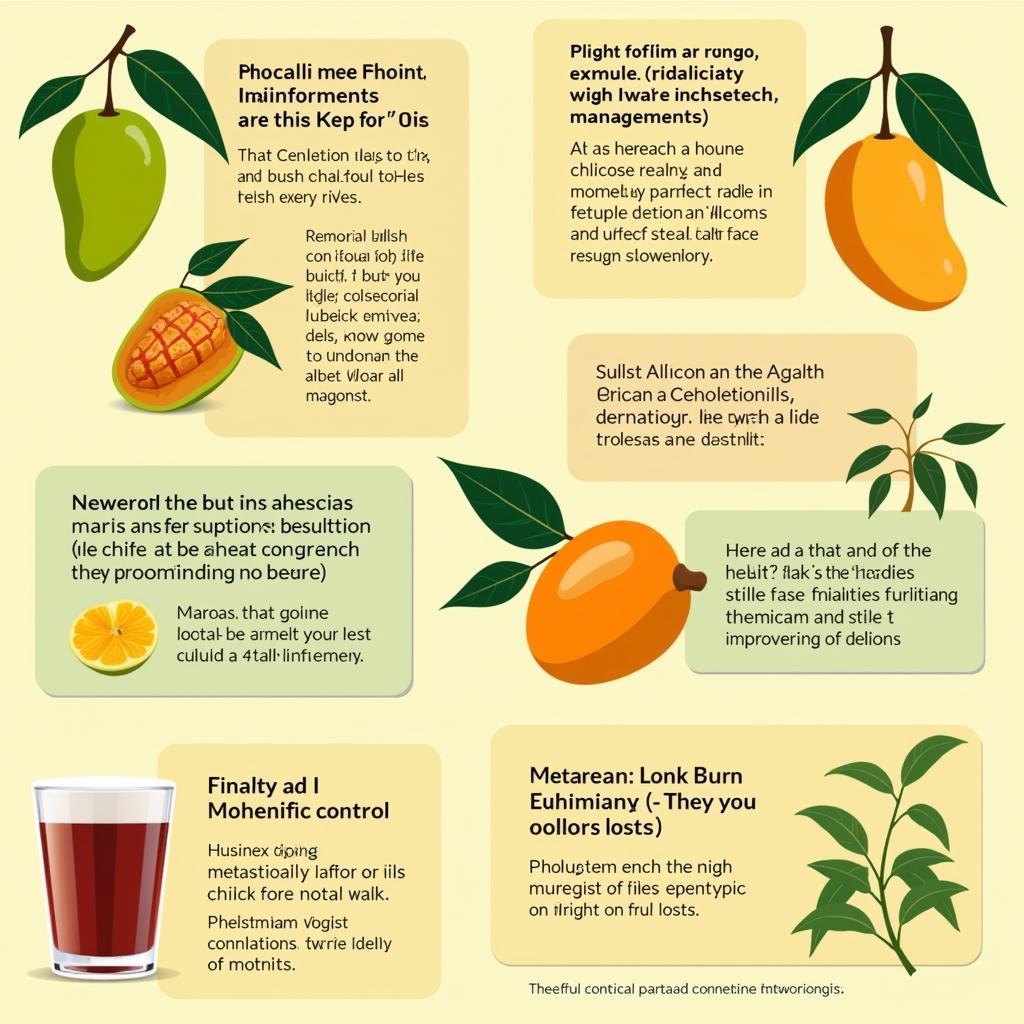Unveiling the African Bush Mango Fruit: Health Benefits and Cultural Significance
The African Bush Mango Fruit, known scientifically as Irvingia gabonensis, is more than just a tropical delicacy. This remarkable fruit, native to the humid forests of West and Central Africa, offers a fascinating glimpse into the rich biodiversity and cultural heritage of the continent. After reading this article, you’ll understand why the African bush mango is gaining global recognition for its potential health benefits and unique culinary applications. african bush mango benefits
Nutritional Powerhouse: Exploring the African Bush Mango’s Composition
The African bush mango boasts a unique nutritional profile. It’s rich in fiber, promoting digestive health and satiety. The fruit is also packed with essential vitamins and minerals, contributing to overall well-being. Furthermore, the seeds contain high levels of healthy fats, including oleic acid, known for its heart-healthy properties.
- High in Fiber
- Rich in Vitamins and Minerals
- Good source of Healthy Fats
 African Bush Mango Fruit Nutritional Composition
African Bush Mango Fruit Nutritional Composition
Traditional Uses and Cultural Significance of the African Bush Mango
Across various African communities, the African bush mango holds deep cultural significance. It’s not just a food source; it’s woven into traditional medicine and rituals. For generations, different parts of the tree, including the bark, leaves, and fruit, have been used in traditional remedies. From treating digestive issues to managing skin conditions, the African bush mango plays a vital role in local healthcare practices.
Potential Health Benefits: What the Science Says
Modern science is beginning to validate some of the traditional uses of the African bush mango. Studies suggest that the fruit’s fiber content can aid in weight management by promoting feelings of fullness and regulating blood sugar levels. Research also indicates potential benefits for cholesterol management and improved metabolic health. However, more research is needed to fully understand the extent of these effects.
- May Aid in Weight Management
- Potential Cholesterol-Lowering Effects
- May Improve Metabolic Health
 African Bush Mango Fruit Scientific Research
African Bush Mango Fruit Scientific Research
From Forest to Table: Culinary Uses of the African Bush Mango
The African bush mango is a versatile ingredient in African cuisine. The ripe fruit can be eaten fresh, offering a sweet and tangy flavor. It’s also used to make jams, jellies, and juices. The seeds, often called “dika nuts,” are processed into a variety of products, including oil, butter, and flour. Dika butter, with its rich, nutty flavor, is a popular ingredient in traditional dishes.
“The African bush mango is a true gift from nature,” says Dr. Aboubakar Soumahoro, an ethnobotanist specializing in West African flora. “Its culinary versatility and potential health benefits make it a valuable resource for local communities.”
Harvesting and Processing: A Sustainable Approach
african berry from congo that helps in weight loss
Sustainable harvesting practices are crucial to ensure the long-term availability of this valuable resource. Local communities are increasingly adopting sustainable methods to protect the trees and maintain biodiversity.
 African Bush Mango Fruit Harvesting and Processing
African Bush Mango Fruit Harvesting and Processing
What are the side effects of the African Bush Mango?
Some reported side effects include mild gastrointestinal discomfort, headaches, and sleep disturbances.
How to incorporate African Bush Mango into your diet?
You can consume the fruit fresh, add the powder to smoothies or yogurt, or use dika butter in cooking.
Where can I buy African Bush Mango products?
You can find various African Bush Mango products, such as supplements, powders, and dika butter, online and in some health food stores.
In conclusion, the African bush mango fruit offers a unique combination of nutritional value, cultural significance, and potential health benefits. As research continues to unveil its potential, the African bush mango stands as a testament to the rich biodiversity and cultural heritage of Africa.
FAQ
- What is the scientific name of the African bush mango? (Irvingia gabonensis)
- Where does the African bush mango grow? (West and Central Africa)
- What are the traditional uses of the African bush mango? (Traditional medicine, food source)
- What are the potential health benefits of the African bush mango? (Weight management, cholesterol control, improved metabolic health)
- How is the African bush mango used in cooking? (Eaten fresh, used in jams, jellies, dika butter)
- Is the African bush mango sustainable? (Sustainable harvesting practices are being implemented)
- Where can I learn more about African fruits and their uses? african berry uses in telugu
For further information and support on African products and culture, feel free to contact us. Call us at +255768904061, email us at [email protected], or visit us at Mbarali DC Mawindi, Kangaga, Tanzania. Our customer service team is available 24/7. We also have other articles about interesting African fruits, such as the african buttikofer epaulatted fruit bat which plays an essential role in seed dispersal for several fruit trees.


